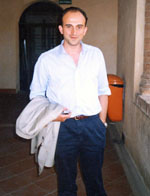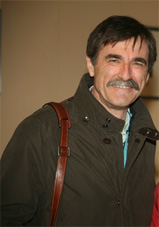The Team

Andriy Oliynyk, current position at University of Ferrara (UNIFE), Ferrara, ITALY,
member of NEUROLAB team.
Full Curriculum Vitae for Collaboration Proposals and Employers is here (NEW!)
Born in 1971. M.D., Ph.D. Graduated with honor M.D. degree in 1994 from Odessa State Medical University (OSMU), Ukraine, speciality – General Medicine. Postgraduate fellow (1994-1997) at OSMU. Ph.D. at 1997 - OSMU, Pathological Physiology. 1997-2007 - Assistant of Professor at OSMU, 2008 – Associate Professor at OSMU, 2004-2011 – researcher at the University of Ferrara, Italy. The research at the Department of Normal Physiology of OSMU was dedicated at understanding of pathologic aspects of epilepsy, a disease that provides "a window into the mind." Experimental studies were focused on behavioral disturbances and bioelectrical activity changes under various and widely used models of epilepsy (electrical or chemical kindling etc.). Later, the investigation of mechanisms behavioral disturbances during experimental epilepsy named my Ph.D. Awards: 1) Honor of Soros Aspirant in 1996; 2) Award by Ukrainian Ministry Council in 2001. Since 2004 have been studied an association between visual information and motor commands in the learning, representation and understanding of actions at the Department of Human Physiology of the University of Ferrara. In particular, I was involved in the electrophysiological single unit recordings from the monkey’s brain from the premotor area F5c. The degree of modulation brain electrical activity when the monkey sees its own hand during execution of grasping actions with and without visual feedback was a specific point of interest. Recently, I have studied the ventral premotor area F5a of the macaque brain, located in-depth of arcuate sulcus. As a result, the functional map of undertaken recording points has been created. Preliminary analysis suggest a role of F5a as possible interface for premotor brain areas in a neuronal circuitry involving parietal, frontal and STS regions during action observation.
A particular focus common to all of these studies is processing of output electrophysiological information, namely, electrical activity changes, discharges of neurons etc.). Understanding how neurons contribute to perception, motor function and cognition requires the reliable measure of spiking activity of individual neurons during a number of different experimental conditions. My personal achievement in this field is developing the method and programming Fuzzy Spike Sorting Software (known here as FSPS) with LabVIEWTM 2009 (National Instruments, USA).
 Luciano Fadiga, current position at University of Ferrara (UNIFE), Ferrara, ITALY;
Luciano Fadiga, current position at University of Ferrara (UNIFE), Ferrara, ITALY;
Italian Institute of Technology, Genova, ITALY
member of NEUROLAB team.
Born in 1961. M.D., Ph.D. Full Professor of Human Physiology. Post-doctoral fellow at the University of Bologna from 1990. Senior Researcher at the University of Parma from 1992 Assistant Professor at the University of Parma from 1997. Associate Professor at the University of Ferrara from 2000. He has a long experience in electrophysiological investigation in monkeys (single neurons recordings) and humans (transcranial magnetic stimulation, study of spinal excitability and brain imaging). Among his contributions are the description of functional properties of monkey area F5, in which, in collaboration with the researchers of University of Parma, he found a set of neurons that discharge both when the monkey makes an action and observes an action made by another individual. It has been suggested that these neurons unify perception and action and are responsible for action understanding (mirror neurons). He further carried out experiments in humans with transcranial magnetic stimulation and in various brain imaging centers (San Raffaele-Milano, USC and UCLA-Los Angeles, HUT-Helsinki) demonstrating that a mirror system exists also in humans. Other fields of his research concern attention and its neuron mechanism in normal subjects and in patients. He is reviewer of many international journals in the field of Neuroscience. Luciano Fadiga was principal investigator in CNR projects on reaching-grasping, he is actually responsible of a Unit founded by the European Commission for the study of the brain mechanisms at the basis of action understanding, he is co-investigator in Human Frontier Science Program and McDonnel-Pew founded projects.

Claudio Bonifazzi, current position at University of Ferrara (UNIFE), Ferrara, ITALY.
Laureatosi in Fisica presso l’Università di Ferrara nel 1980, ricopre il ruolo di Ricercatore confermato di Fisiologia presso la Facoltà di Medicina e Chirurgia dell’Università di Ferrara. È incaricato di dell’insegnamento di Fisiologia I, dell’insegnamento di Statistica per la Ricerca Sperimentale e Tecnologica per le classi di Laurea delle Lauree Specialistiche nelle Professioni Sanitarie, di Analisi dei Dati per il corso di Laurea in Scienze Motorie e di Informatica per la Laurea in Infermieristica. I suoi interessi scientifici e la sua attività di ricerca sono stati indirizzati sempre allo sviluppo ed alla applicazione di avanzati metodi di analisi dei dati, analisi dei segnali e delle immagini nei settori delle Fisica Applicata, della Fisiologia del Sistema Nervoso e della Produzione Industriale. È responsabile scientifico di alcuni contratti di ricerca stipulati dall’Università di Ferrara con Enti di diritto pubblico (ENEA; ARPA; CNR) e con aziende produttrici attive nel settore metallurgico, dello stampaggio di materie plastiche per uso sanitario.

Stefano Panzeri, current position Italian Institute of Technology, Genova, ITALY.
Stefano Panzeri received a Laurea in Physics from the University of Torino, and a PhD in Computational Neuroscience from SISSA, Trieste, Italy.
He has held personal Research Fellowship awards in both theoretical physics and computational neuroscience, including an INFN junior Fellowship in Theoretical Physics at Turin University, an EU Marie Curie postdoctoral Fellowship at the University of Oxford, and an MRC Research Fellowship in Neuroinformatics at the University of Newcastle. Since 2002, he has been a Faculty member at the University of Manchester, where from 2007 he was promoted to a Readership. He serves as Deputy Chair of the UK Medical Research Council panel for fellowships in Bioinformatics and Neuroinformatics; as a member of the UK EPSRC Review College, and as an editor of the journal Frontiers in Systems Neuroscience.
His research lies at the interface between theory and experiment and aims at understanding the principles of cortical information processing by developing new quantitative data analysis techniques based on the principles of Information Theory and by developing computational models of neural network function. At IIT, he set up the the Laboratory of Brain Signals Analysis, which has the purpose to develop techniques to decode the information content of the brain recordings used to drive brain-machine interfaces.

Fernando Fabian Montani, current position at Instituto de Física de Líquidos y Sistemas Biológicos, ARGENTINA.
Obtained a Doctor degree in Physics at Universidad de La Plata (Argentina), before obtaining his Doctor of Philosophy degree from Imperial College London (London, UK) under the supervision of Prof. Simon R. Schultz, for work on information theoretical approaches to investigate the neuronal spike correlations in the mammalian cerebral cortex. He has developed Theoretical methods based on information theory for analyzing data recorded from neuronal populations, showing his expertise in applying methods of theoretical physics to neuroscience. He currently runs a Complex Systems and Theoretical Neuroscience Lab. at the Universidad of La Plata. He is very interested in investigating how neuronal populations encode dynamical information, and in using methods of statistical physics to modeling how defects in cell migration during neurogenesis affect the network activity, problems of critical importance in the future of systems neuroscience.
